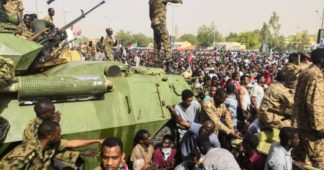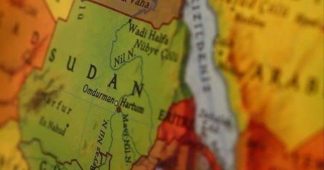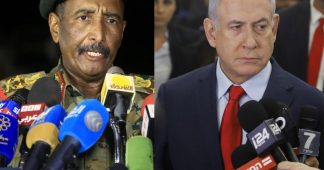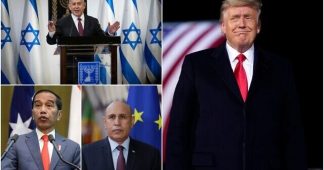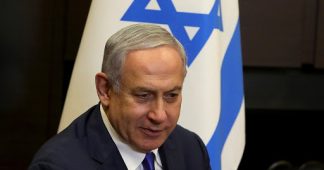Israel is engaged in efforts to de-escalate tensions in Sudan, but its security and diplomatic leaderships are split between the two fighting camps.
By Ben Caspit
Apr 21, 2023
The director general of Israel’s Foreign Ministry, Ronen Levy, confirmed Thursday that Jerusalem is involved in international efforts to de-escalate the current conflict in Sudan and is in contact with both fighting camps.
Interviewed by Israel’s public broadcaster KAN, Levy said Israel will pursue an end to the current unrest and the normalization of diplomatic relations. “Everyone is making efforts to get Sudan back on track. We are not giving up on normalization. The Americans are involved, and we are assisting vis-a-vis both sides. We are helping to exert direct pressure to bring about calm and an end to the war,” he said.
Indeed, despite its domestic turmoil and the deterioration of its international standing, Israel currently finds itself in the role of the responsible adult at least in one arena — the escalating fighting between loyalists of Sudan’s leader Gen. Abdel Fattah al-Burhan and the powerful Rapid Support Forces (RFS) militia led by his former deputy Mohamed Hamdan Dagalo, aka Hemedti.
The fighting has dashed Israeli hopes to rapidly complete the formal signing of an agreement it reached with Sudan in 2020 on normalizing diplomatic relations with the Muslim nation. While finalizing the agreement appears highly unlikely for the moment, given the fighting, Israel has turned its hand to mediation efforts between the warring sides to help advance the African country’s stalled transition from military rule to democracy.
Israeli-Sudanese ties were tense for many years, on the backdrop of Khartoum’s support of the Palestinian cause and the country’s close relations with Iran. When Khartoum severed its ties with Tehran in 2016, things started to change, and more so, after the toppling of Sudan’s dictator Omar al-Bashir in 2019.
In October 2020, the government in Khartoum agreed to normalize ties with Israel, in the framework of the Abraham Accords Israel had signed earlier with Bahrain and the United Arab Emirates (UAE). In February 2023, Israeli Minister of Foreign Affairs Eli Cohen visited Khartoum, meeting with Burhan and other top officials to put the final touches on the deal. Cohen’s visit followed that of a senior Sudanese delegation to Israel the previous week.
Cohen was hoping to finalize the deal there and then, or at least to announce an upcoming ceremony in Washington, but that did not happen. Faced with some objection from within, the Sudanese leadership made it clear that the signing of the agreement was unlikely to happen immediately. Washington had adopted the same approach, clarifying to Jerusalem it would sponsor the finalizing of the deal only when a civilian transition government is in place.
A top Israeli diplomatic official told Al-Monitor on condition of anonymity that Israel was still undecided of its role in the conflict. “The problem with Israeli involvement is that we have not quite decided who we support and we are playing a double game, helping both Burhan and Dagalo. Both sides are aware of this and are demanding clarification from us. At this rate, not only will we not be able to reconcile between them, there is a good chance that we will succeed in uniting them against us,” the official said.
The official was referring to the two different Israeli government arms engaged in ties with Sudan — the Mossad and the Foreign Ministry. The two leading Israeli officials operating vis-a-vis Khartoum in recent years were then-Mossad Director Yossi Cohen, whose intelligence agency had greatly expanded under his leadership its activities in the giant African country, and Ronen Levy, previously known only by his pseudonym “Maoz” that he used during his service in the Shin Bet security agency, who was until recently a senior official in the National Security Council (NSC). Both men were involved in under-the-radar ties with Sudan for years.
“The director general of the Foreign Ministry is on Burhan’s side,” a senior Israeli security source explained on condition of anonymity. “The Mossad is more on Hemedti’s side.” Hemedti was even invited on a secret visit to Israel, apparently against the advice of Israeli professionals who feared that word of the visit would leak to the other side, which was the dominant authority in Sudan at the time. “When you try to hold both ends of the stick at the same time, you end up getting beaten with it,” a senior Israeli diplomatic source told Al-Monitor on condition of anonymity.
The Mossad has a long history of involvement in Sudan, some of which came to light when it smuggled tens of thousands of Ethiopian Jews to Israel in the 1980s through a fictitious resort it established on the shores of the Red Sea in Sudan, from which the immigrants were transported to Israel on giant C-130 military transport planes. Subsequent film depictions of the operation — the Red Sea Diving Resort — painted the Mossad in a complimentary light. In 2009, in the initial days of Israel’s shadow war with Iran, Israeli air and naval forces bombed trucks carrying Iranian-supplied weapons from Sudan’s Red Sea shore through Sudan to Hamas in the Gaza Strip, successfully cutting off that smuggling route, according to foreign media reports.
Sudan’s shift away from the Iran-led Islamic resistance axis to the pragmatic Saudi-led Sunni bloc in 2016 facilitated the warming of relations with Israel, with deep American involvement. Israel hopes its current investment of time and energy in attempts to restore calm between the warring sides will contain the potential damage to this promising strategic relationship with Khartoum.
“Ultimately, it is a quarrel between various associates of Sudan’s former President Bashir,” a former senior Israeli diplomatic source told Al-Monitor on condition of anonymity. “Civilian rule in Sudan at this stage is clearly a distant dream. Those hurt the most are the Sudanese people, who are fed up with the dictatorship and want stability and democracy. Israel must think about this angle as well, and not act only according to its interest in restoring calm and getting a speedy signature on the appropriate papers.”
“The Mossad is more identified with Hemedti’s side in light of the fact that it is also the side more identified with the UAE,” said the source. The Mossad has excellent ties in the Gulf, especially with the UAE, while the NSC, and now the Foreign Ministry (under Levy), are considered to be working mainly with Burhan. “This split could cause serious damage, but on the other hand, it allows Israel to represent both sides at the same time, to take advantage of these dual ties to calm the situation and try to extinguish the flames.”
We remind our readers that publication of articles on our site does not mean that we agree with what is written. Our policy is to publish anything which we consider of interest, so as to assist our readers in forming their opinions. Sometimes we even publish articles with which we totally disagree, since we believe it is important for our readers to be informed on as wide a spectrum of views as possible.
